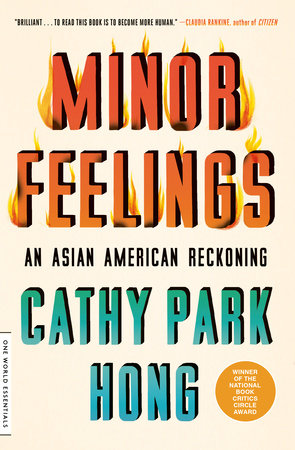I recently finished the book Minor Feelings by Cathy Park Hong that my friend Jingyi has recommended to me. Here are some unorganized thoughts on it.
When I read McMillan’s book Thick, there was one expression she used to describe something she read that stuck with me: I didn’t know this was allowed. This expression pretty much summarizes my reaction to Hong’s book, too. I didn’t know we were allowed to talk about these things.
The truth is that I procrastinated for a long time from reading this book or any other “identity stories”. When I did, I read from people that were nothing like me. And of course none of those stories resonates. And I’d just conclude that I don’t like reading memoirs.
But why do I not want to read stories that might sound like mine? Hong actually writes about this. Just like the book title Minor Feelings, my stories just feel very … minor. Uninteresting. Inconsequential. Not worthy of being told (“不足为外人道也” keeps coming to mind). And in any case it’s unclear what moral we are supposed to draw from them. This is what I’ve always felt, but it wasn’t until I read Hong talking about it that I realized how little thought I’ve given it. It’s not that I’ve thought about them and decided they were uninteresting; I’ve decided they were uninteresting and therefore have never thought about them.

The first, and hopefully last, overtly and unambiguously racist thing I’ve ever experienced was in a museum in Vancouver. I was something like 16 or 17 and with my mom on a tour trip. An old white woman yelled at us in the women’s washroom, saying that we eat dogs and should go back to China. We were both stunned. My mom tried to say something with her broken, business-trained English, but I don’t think she managed anything coherent before the woman left the washroom. She was upset, but we never talked about it.
The rest of that Vancouver trip was lovely. I liked Vancouver; I still do. I decided to go to Vancouver for undergraduate instead of staying in Alberta or go to Toronto like everyone else from my high school circles. I did it because I liked Vancouver.
The story that I was yelled at by a white lady in the washroom of a museum on my first ever trip to Vancouver does not fit with my narrative, so I never talked about it. Every so often I remember the incident, and think up stuff I would say if it ever happened to me again. I never avoided museums because of it, or white old ladies for that matter.
I don’t talk about it because of I can’t make sense of the inconsistency of this story, to myself or to others. If I say “I love Vancouver”, that makes sense because it’s a nice place. But if I say “I love Vancouver; also that’s where I had my worst racist incident from a stranger”, all of a sudden I need an explanation. I don’t have one.
I was chatting with Chris the other day about misogyny in academic contexts and it made me (and Chris, but he has better excuse) realize how much better my life is than what it could’ve been. I was raised in perhaps the most liberal part of China, during perhaps the most liberal period of time, so much so that none of my family members has ever expressed regret for not having a son. And yet I grew up being convinced of the general narrative every Chinese woman knows: girls work hard and boys are smart; I may have good grades now but when classes get *real* hard later, boys will inevitably outshine me.
This narrative is so common that we don’t even talk about it. When my father introduced me as a “future PhD” to his friends, everybody has one of these two reactions: 1) how are you gonna find a husband with that degree? It’s too intimidating. 2) it’s good for girls to get some education and become a teacher/professor; it’s good for raising children.
My life is much better than how it could have been.
In Minor Feelings, Hong writes about being an ungrateful immigrant. There is this expectation that, since our lives have improved in the new environment, to keep complaining is to be ungrateful. Besides, I don’t have it nearly as bad as many people have it, so why bother.
I suppose reading Minor Feelings taught me that I didn’t have to be always making a point. I can still talk about these minor feelings that I have, without the expectation that I need to draw a moral from it or the worry that the moral may be inconsistent.
The book’s full title is Minor Feelings: An Asian American Reckoning. It does feel like a reckoning to me — one that I didn’t know I lacked. It’s a great book! Go read it!
- It might happen after all - May 14, 2023
- Another job market data point - December 17, 2022
- Our place in the fediverse - November 30, 2022